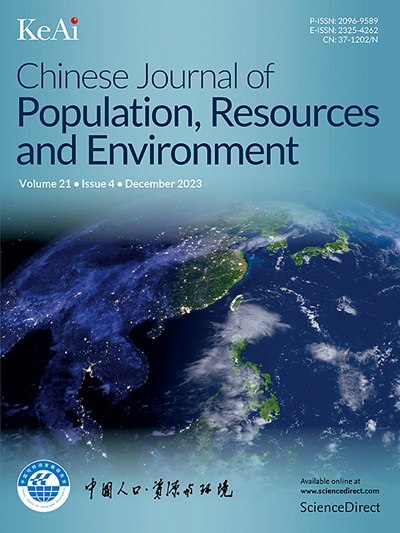Is there a peer effect on corporate ESG performance? Evidence from China’s capital market
IF 4.8
4区 环境科学与生态学
Q2 ENVIRONMENTAL STUDIES
Chinese Journal of Population Resources and Environment
Pub Date : 2024-12-01
DOI:10.1016/j.cjpre.2024.11.006
引用次数: 0
Abstract
Corporate ESG performance is an important way for stakeholders to understand the corporate environment, social responsibility, and governance behavior. Under China’s implementation of the “carbon peak and carbon neutrality” dual carbon strategic background, ESG has become an important tool to promote the achievement of the “dual carbon” goals and high-quality development. How enterprises can reasonably and effectively improve their ESG performance and promote their green and sustainable development has become a major practical problem that urgently needs to be solved. Based on social learning and dynamic competition theories, this study takes Shanghai-Shenzhen A-share listed companies from 2011 to 2021 as research samples, empirically tests whether there is a peer effect in the ESG performance of listed companies in China, and examines the generation mechanism and influencing factors of the peer effect in the ESG performance of enterprises. The results show that: (i) There is an industry and regional peer effect on the ESG performance of enterprises, where the average ESG performance of other enterprises in the same industry and region, except for the focus enterprise, significantly affects the ESG performance of the focus enterprise.This core conclusion still holds true after robustness tests such as instrumental variable method, propensity score matching method, and first-order difference method to eliminate endogeneity issues, replace key measurement indicators, and control for macro factors. (ii) The mechanism analysis results show that the “information learning” and “competitive pressure” mechanisms promote the peer effect of ESG performance. (iii) Further research has found that institutional investors’ attention and government environmental regulations positively and significantly impact the peer effect of corporate ESG performance. (iv) Heterogeneity analysis shows that the ESG performance peer effect is more significant for large-scale, eastern, and state-owned enterprises than for small-scale, central, western, and non-state-owned enterprises. This study expands the boundaries of current ESG theory and empirical research, and the conclusions provide important policy implications for governments and enterprises.
企业ESG绩效是否存在同侪效应?来自中国资本市场的证据
企业ESG绩效是利益相关者了解企业环境、社会责任和治理行为的重要途径。在中国实施“碳峰值与碳中和”双碳战略背景下,ESG已成为推动实现“双碳”目标和高质量发展的重要工具。企业如何合理有效地提升ESG绩效,促进企业绿色可持续发展,已成为一个迫切需要解决的重大现实问题。本研究基于社会学习理论和动态竞争理论,以2011 - 2021年沪深a股上市公司为研究样本,实证检验中国上市公司ESG绩效中是否存在同伴效应,并考察企业ESG绩效中同伴效应的产生机制和影响因素。研究结果表明:(1)企业ESG绩效存在行业和区域对等效应,除重点企业外,同一行业和地区其他企业的平均ESG绩效显著影响重点企业的ESG绩效。通过工具变量法、倾向得分匹配法、一阶差分法等鲁棒性检验,消除内生性问题,替换关键计量指标,控制宏观因素,这一核心结论仍然成立。(二)机制分析结果表明,“信息学习”和“竞争压力”机制促进了ESG绩效的同伴效应。(三)进一步研究发现,机构投资者关注度和政府环境法规对企业ESG绩效的同伴效应具有显著正向影响。(四)异质性分析表明,规模企业、东部企业和国有企业的ESG绩效同伴效应比规模企业、中部企业、西部企业和非国有企业更显著。本研究拓展了当前ESG理论和实证研究的边界,研究结论对政府和企业具有重要的政策指导意义。
本文章由计算机程序翻译,如有差异,请以英文原文为准。
求助全文
约1分钟内获得全文
求助全文
来源期刊

Chinese Journal of Population Resources and Environment
ENVIRONMENTAL STUDIES-
CiteScore
4.30
自引率
1.10%
发文量
791
审稿时长
79 days
期刊介绍:
The Chinese Journal of Population, Resources and Environment (CJPRE) is a peer-reviewed international academic journal that publishes original research in the fields of economic, population, resource, and environment studies as they relate to sustainable development. The journal aims to address and evaluate theoretical frameworks, capability building initiatives, strategic goals, ethical values, empirical research, methodologies, and techniques in the field. CJPRE began publication in 1992 and is sponsored by the Chinese Society for Sustainable Development (CSSD), the Research Center for Sustainable Development of Shandong Province, the Administrative Center for China's Agenda 21 (ACCA21), and Shandong Normal University. The Chinese title of the journal was inscribed by the former Chinese leader, Mr. Deng Xiaoping. Initially focused on China's advances in sustainable development, CJPRE now also highlights global developments from both developed and developing countries.
 求助内容:
求助内容: 应助结果提醒方式:
应助结果提醒方式:


